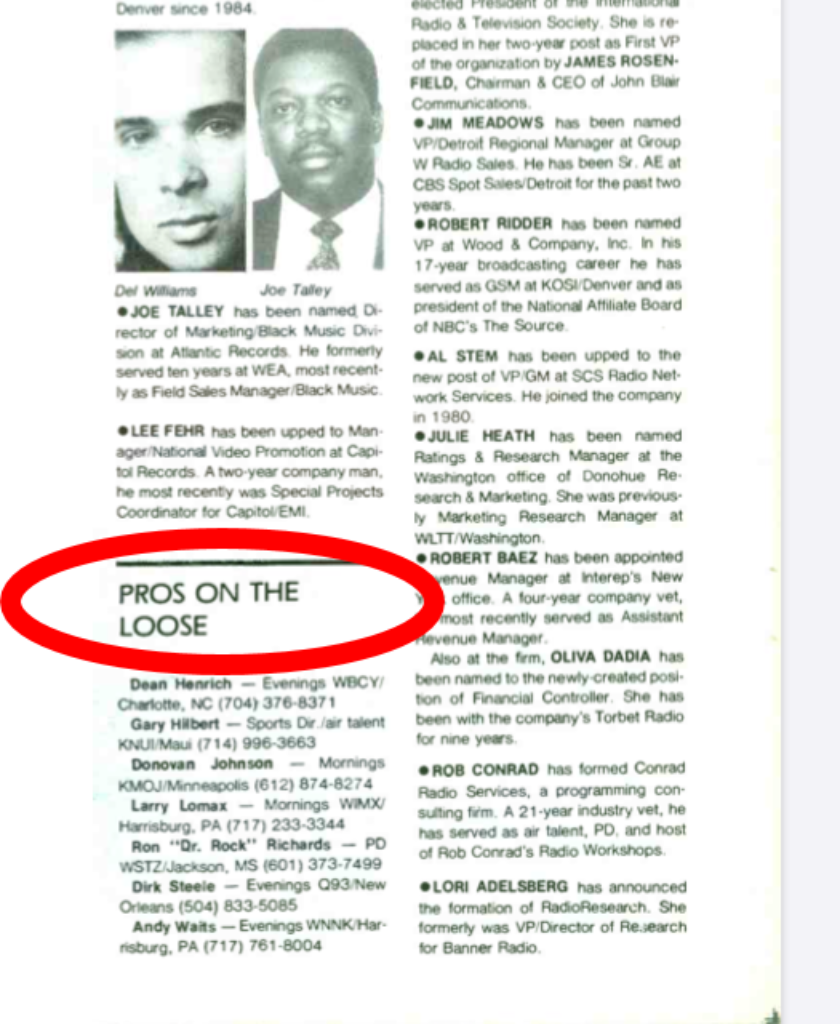
I don’t remember a period of time since I’ve been involved with broadcast radio where there’s been more tumult among the rank-and-file in radio. The iHeartMedia layoffs – or “dislocations” – earlier this month rocked the world of radio, following so-called “reductions in force” by a number of other companies.
I speak to many, many people in the business, representing programming, sales, digital, and other departments inside radio stations. And I don’t ever recall a period where there’s been more angst and hand-wringing in radio circles than these past few months.
While the most highly visible “dislocations” have revolved around personalities and shows, make no mistake that many of these terminations have involved all positions inside radio stations – programmers, sales managers, and others – deemed to be non-essential to future operations.
Many who are still gainfully employed are nervously waiting for more shoes to drop. But history shows that those who are prepared and well-networked have the best chance of landing on their feet with minimal down time.
It’s interesting that pre-2000, these types of “reductions in force” in radio basically didn’t exist. Yes, people were fired, left and right. But few positions were eliminated.
One of the industry’s seminal trade publications, Radio & Records, used to publish notes each week in a below-the-fold section  called “Pros On The Loose” at the very bottom of their “Newsbreakers” page, highlighting people who had just lost their jobs. It simply wasn’t that big a deal – sort of “oh, by the way” information. Most people did not have much trouble finding their next gig.
called “Pros On The Loose” at the very bottom of their “Newsbreakers” page, highlighting people who had just lost their jobs. It simply wasn’t that big a deal – sort of “oh, by the way” information. Most people did not have much trouble finding their next gig.
If R&R existed today, it would need an entire issue dedicated to publicizing the hundreds – or perhaps 1,000 or more – of those who have recently become unemployed.
One of the hard parts for many in the business – the “dislocated” and those seeking to hire talented, qualified people – is to know the extent and the details of these moves. Understandably, companies don’t publish lists of those who have lost their jobs. Instead, the news slowly leaks out to the industry trades. We may not know the full extent of this industry-wide downsizing for months.
But we can do something about it.
We can help those who are dislocated – and who wish to stay in radio – find their next opportunity to shine.
And we can help companies that are hiring find qualified, motivated employees ready to get back to work.
Sadly, we’ve been here before. Back when the Great Recession reshaped the radio industry – and from which it has not recovered – we launched a  placement program called “Ready To Rock.” Back then, our business was more focused on Rock Radio, hence the name. “Ready To Rock” was announced 11 years ago yesterday.
placement program called “Ready To Rock.” Back then, our business was more focused on Rock Radio, hence the name. “Ready To Rock” was announced 11 years ago yesterday.
The purpose of that effort was to provide a lifeline to hundreds and hundreds of dedicated radio pros who were looking for work. And here we are again.
So today, we’re launching an industry directory for the “dislocated” and those who wish to hire them. There is no charge, no time limit – nothing. We just want to help people find their next job. Job-seekers can choose their format and job preferences, as well as upload a resume, photo, audio file, and social media links. In this way, we hope employers will have sufficient information on the front end to begin the process.
We will spend the next couple weeks collecting submissions from those looking for a job. Then we’ll open the “Find Talent” section to help employers connect with them.
If you’ve been “dislocated,” the link is here.

If you know of people who are looking, we’re here to help. Please forward this post and/or the link to them. We have a much more robust Internet in 2020 – it should not be difficult to get the word out to those who wish to work in radio – and those interested in hiring them.
The radio community has proved to be resilient, supportive, and empathetic. We all know people who have been impacted by these changes in the industry. We know broadcasters will step up once again.
We’ll keep you posted. As always, comments are welcome below.
Thanks to Seth Resler for his work on this project.
- Media And Technology In 2025: Believe It Or Not! - April 18, 2025
- In Radio, You Just Never Know - April 17, 2025
- The Secret To Making A Great Podcast (And Great Radio) - April 16, 2025




Thank you to you, Fred, and to your team, for stepping up and launching this initiative. There are opportunities out there and this is a great way to connect. We (Texas Public Radio) just hired two people in the past 30 days and have plans to continue to grow. When you are ready to add resources who are hiring, we’ll add our company to the list.
Appreciate that, Wendy. Thanks for engaging in this important area for broadcast radio.
Fred,
All of these layoffs are coming when the economy is very strong. I’m worried about what will happen to the industry in the next downturn. I know radio is resilient, but can it survive another recession?
You’re not the first person to bring this up, Steven. It is a very good question. That said, if other media outlets prove to be too expensive in a recession, maybe radio benefits. We won’t know until we get there, of course.
Heartbreaking… Pittman has stripped the radio industry of its “live and local” mantra forever… the nation’s radio stations are nothing more than jukeboxes… I dare say SiriusXM has more personality than the local dial now.
At time, yes, Chuck. I’ve noticed that, too. Personality is what makes radio special, unique, local – and not a playlist service. Sad that budget cuts are hitting the air studio so hard.
Where are the young, rich and interested buyers of radio stations? When we here in Boston lost WFNX to iHeart I wondered why people like the Green Day guys, or Jack White didn’t swoop in and buy the place. Why didn’t a 20-something high-tech brain/music lover snatch it up? It’s long past time for radio to reinvent itself, but in the hands of the current owners it seems destined to crash and burn. But will it rise from the ashes, or are we witnessing the beginning of its obsolescence? Ironic that radio is front and center in the news this week – but it’s noncommercial radio. I must admit to being very proud of what goes on – on the left side of the dial, and playing a small role there.
Tai, good thoughts all. I met the manager of the station Steve Wonder owns in LA, KLJH (Keep Joy Love Happiness) & this example is exactly what you’re referring to. Clearly, there needs to be more innovation and imagination in the way we run radio stations. Radio may have lost its “cool factor,” but as we know, still retains the reach, ability, and habit necessary to build a large audience in any community. As for the “left side of the dial,” we are also proud of the work we’ve done on behalf of public radio. Not enough commercial broadcasters truly understand how that system serves its audience in innovative ways.
Thanks, Fred for offering this directory to us dislocatees. This is no time to ‘shelter in place’. Getting laid off has lit a fire, and motivated me. The support I’ve been getting from my industry colleagues and old friends has been really encouraging. I’ve been through layoffs before, but this time is different. I’m seeing this as an opportunity to get to the next chapter. So before another ‘shoe drops’, I’ve got boots on the ground, reaching out and looking inward, stepping back and moving forward with momentum – and with my new power word: “Ask”. The responses and help I’ve received over the past two weeks is keeping me going. The follow up to ‘ask’ of course, is ‘give’, and ‘give back’ to colleagues in the same boat. We’ve got to have each other’s backs.
Absolutely, Marylee. Keep us in your loop, and hopefully, you’ll be back at it soon. Good hearing from you. Let us know.